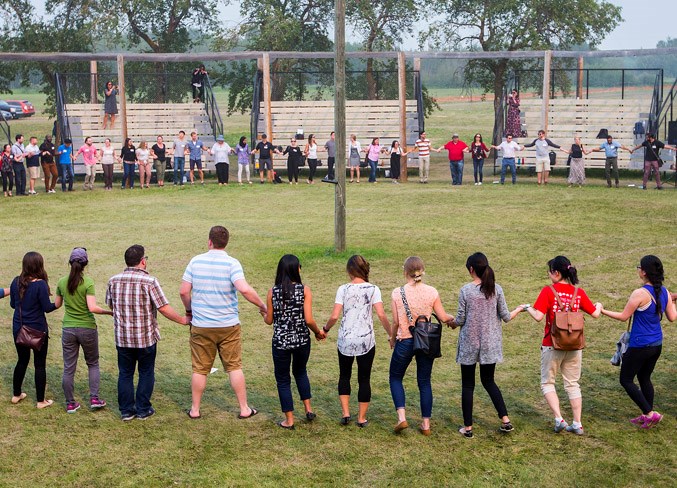If you’re of First Nations ancestry, you probably don’t have much trust in your doctor, Rick Lightning says.
That’s because Indigenous peoples have lived with decades of mistreatment by Canada’s health-care system, where they were required to attend racially segregated, overcrowded and underfunded Indian hospitals such as the Charles Camsell in Edmonton, Lightning said. Those hospitals were so rife with abuse and malpractice that they are now the subject of a $1.1-billion class-action lawsuit.
“We never got the best of anything, including medicine,” said Lightning, an elder from Maskwacis. “We were looked at as lower-class citizens.”
Lightning was one of the many elders and experts on hand at Poundmaker’s Lodge Wednesday to teach about 100 University of Alberta family medicine students about the Indigenous experience with health care.
This was the second time the U of A has held one of these Indigenous Health Academy days and the first time it had done so at Poundmaker’s, said organizer Cara Bablitz, a doctor of family medicine at the U of A.
“There are many health inequalities that Indigenous people face,” she said, including higher rates of diabetes and infant mortality and 15 years less life expectancy.
Many of these inequalities are rooted in Canada’s past treatment of Indigenous peoples and inter-generational trauma, Bablitz said. Today’s doctors have a duty to address these inequalities in order to affect reconciliation. Poundmaker’s past efforts in this area and its network of knowledgeable elders made it a great fit for this teaching event.
History and health
Students heard talks about Canada’s Indigenous history, spoke with elders about their experiences with the health-care system and experienced traditional First Nations hoop dancing and drumming.Alika Lafontaine, an anaesthesiologist and the North Zone medical director for Indigenous Health for Alberta Health Services, said research shows that Indigenous patients experience abusive or ignorant treatment from doctors and nurses at a much higher rate than others, often alongside explicit racism. This has been going on for so many years that many patients see this poor treatment as normal and don’t report these abuses. Doctors, meanwhile, may believe that it’s OK to skimp on treatment for Indigenous patients or that their patients won’t bother to follow their advice.
“All those things colour the patient experience,” Lafontaine said.
Second-year med student Parker Vandermeer said he could sense a divide between himself and his patients when he worked on First Nations reserves up north a few years ago. That’s a problem as, if you don’t have a good relationship with your patients, they won’t listen to your advice.
“What we need more of is exposure,” he said, as today’s med students get little education on Indigenous peoples.
Vandermeer said Wednesday’s forum helped him better appreciate the inter-generational impacts of residential schools and made him more open to asking patients about how Canada’s Indigenous history had affected them.
Lafontaine encouraged students to practice “reflective care,” where they think about the evidence and processes they use to make their decisions instead of relying on snap judgments. Instead of deciding a patient with flank pain must have a kidney stone because they’re Indigenous, for example, run the tests you need to confirm it.
Lightning advised students to ask Indigenous patients about their ancestry and background as a starting point, noting that there were many tribes, languages and traditions out there.




